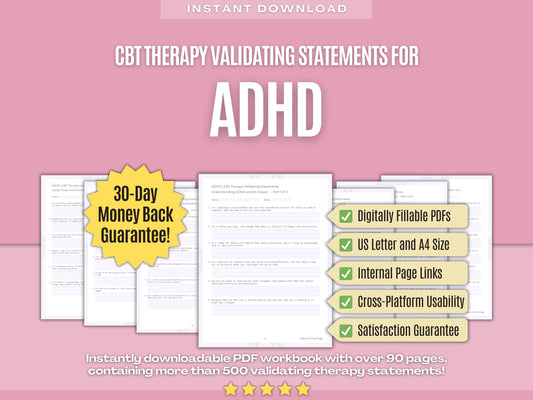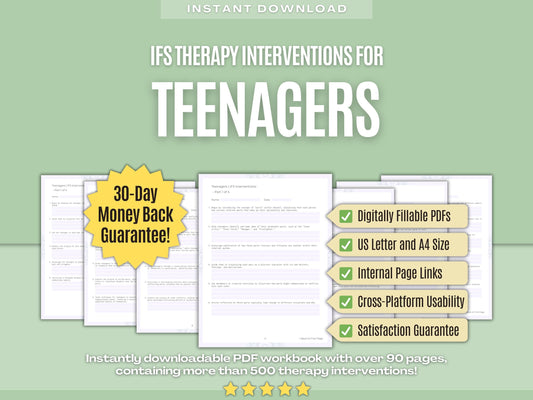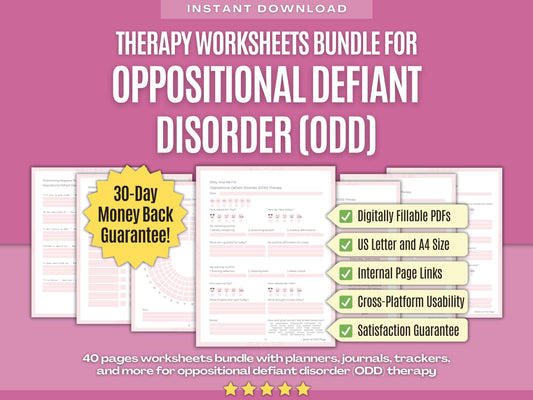Elevate Your Therapy and Guide Your Clients to Inner Healing with Our Self-Compassion Coping Skills! ✨
1. Cultivating a Kind Inner Voice
- Begin by recognizing and acknowledging your inner critic, the voice within that tends to be harsh and judgmental toward yourself.
- Challenge the negative self-talk of your inner critic by questioning its validity and exploring alternative, more compassionate perspectives.
- Write down affirmations or positive statements about yourself and repeat them regularly to reinforce a kinder inner voice.
- Practice gratitude by focusing on the things you appreciate about yourself and your life, fostering a sense of self-worth and well-being.
- Challenge unrealistic standards and expectations by setting more achievable goals and acknowledging your efforts and progress along the way.
- Practice self-compassionate forgiveness by letting go of past mistakes and treating yourself with understanding and compassion.
- Set boundaries with yourself and others to protect your emotional well-being and honor your needs and priorities.
- Seek out therapy or counseling to explore and work through deeper issues related to your inner critic and self-esteem.
- Practice self-compassionate problem-solving by approaching challenges with curiosity, creativity, and flexibility.
- Cultivate mindfulness through meditation, deep breathing exercises, or other relaxation techniques, helping to quiet the inner critic and cultivate a kinder inner voice.
- Practice self-compassionate self-acceptance by embracing all aspects of yourself, including your flaws, vulnerabilities, and imperfections.
Need more? Find all 500+ Coping Skills for Self-Compassion Therapy in our Digital Workbook!
2. Recognizing Our Common Humanity
- Begin by reflecting on the shared human experience, recognizing that all people experience suffering, imperfection, and vulnerability at some point in their lives.
- Engage in acts of kindness toward others, recognizing that small gestures of compassion can have a profound impact on both the giver and the receiver.
- Practice self-compassion by recognizing that you are not alone in your struggles and that it is okay to seek help and support when needed.
- Practice forgiveness toward yourself and others, recognizing that we are all imperfect beings who make mistakes and deserve compassion and understanding.
- Practice gratitude by focusing on the positive aspects of your life and acknowledging the support and kindness you receive from others.
- Challenge feelings of shame and inadequacy by recognizing that everyone has their own insecurities and vulnerabilities, and that it is okay to be imperfect.
- Reflect on the ways in which your own struggles and challenges can be a source of strength and resilience, inspiring others who may be going through similar experiences.
- Seek out opportunities to volunteer or contribute to causes that are meaningful to you, fostering a sense of purpose and connection with others.
- Challenge feelings of superiority or inferiority by recognizing that we are all equal in our humanity, regardless of external markers of success or status.
- Reflect on the ways in which you have been supported and uplifted by others throughout your life, recognizing the interconnectedness of our human experience.
- Challenge stereotypes and prejudices by seeking out diverse perspectives and experiences, fostering empathy and understanding toward people from different backgrounds and walks of life.
Need more? Find all 500+ Coping Skills for Self-Compassion Therapy in our Digital Workbook!
3. Mindfulness in Self-Compassion
- Start by practicing mindfulness meditation, focusing your attention on your breath or a specific point of awareness to anchor yourself in the present moment.
- Practice mindful eating by savoring each bite of food, paying attention to the flavors, textures, and sensations in your mouth and body.
- Practice mindful listening by fully focusing your attention on the sounds around you, without trying to analyze or interpret them.
- Practice mindfulness in everyday activities such as washing dishes, brushing your teeth, or taking a shower, fully immersing yourself in the present moment.
- Engage in mindful breathing exercises throughout the day to help anchor yourself in the present moment and calm your mind and body.
- Use mindfulness to manage stress by noticing when you're feeling overwhelmed or anxious, and using mindfulness techniques to bring yourself back to the present moment.
- Use mindfulness to manage difficult emotions by bringing awareness to the sensations in your body and observing your thoughts and feelings with curiosity and compassion.
- Use mindfulness to cultivate gratitude by noticing and appreciating the small moments of beauty and joy in your life.
- Use mindfulness to cultivate resilience by noticing when you're feeling overwhelmed or stressed, and using mindfulness techniques to regulate your emotions and calm your mind.
- Use mindfulness to improve focus and concentration by bringing awareness to your breath or a specific point of focus, and gently bringing your mind back whenever it wanders.
- Use mindfulness to cultivate self-awareness by noticing your thoughts, feelings, and reactions in various situations, without judgment or attachment.
Need more? Find all 500+ Coping Skills for Self-Compassion Therapy in our Digital Workbook!
4. Embracing Your Imperfections
- Begin by reframing your perspective on imperfections, recognizing that they are a natural and unavoidable part of the human experience.
- Challenge the unrealistic standards and expectations you may hold for yourself by acknowledging that perfection is unattainable and embracing the beauty of imperfection.
- Practice self-acceptance by embracing all aspects of yourself, including your flaws, quirks, and vulnerabilities, as integral parts of who you are.
- Challenge the comparison trap by recognizing that everyone has their own unique strengths and weaknesses, and that there is no one "right" way to be.
- Set realistic goals and expectations for yourself, acknowledging your limitations and celebrating your achievements, no matter how small.
- Seek out supportive and affirming relationships and communities where you can feel accepted and valued for who you are, imperfections and all.
- Practice self-compassionate self-talk by responding to self-critical thoughts with words of kindness and encouragement, rather than judgment or condemnation.
- Reflect on past experiences of growth and resilience, recognizing that imperfections are opportunities for learning and personal development.
- Practice mindfulness by bringing your attention to the present moment and noticing the thoughts and feelings that arise without judgment or attachment.
- Practice self-compassionate problem-solving by approaching challenges with curiosity and flexibility, rather than self-criticism and blame.
- Practice self-compassion meditation or visualization exercises to cultivate feelings of warmth, acceptance, and kindness toward yourself.
Need more? Find all 500+ Coping Skills for Self-Compassion Therapy in our Digital Workbook!
5. Building Resilience through Self-Compassion
- Begin by recognizing that resilience is not about avoiding or suppressing difficult emotions, but rather about facing them with courage, compassion, and strength.
- Cultivate self-awareness by noticing when you're experiencing difficult emotions, and exploring the underlying thoughts, beliefs, and sensations that accompany them.
- Engage in self-compassionate self-talk by responding to self-critical thoughts with words of reassurance and encouragement, rather than judgment or condemnation.
- Practice mindfulness by bringing your awareness to the present moment and noticing the thoughts, feelings, and sensations that arise without judgment or attachment.
- Challenge the belief that you need to have all the answers or be in control of every situation, recognizing that it's okay to ask for help and support when needed.
- Practice self-care by engaging in activities that nurture your physical, emotional, and spiritual well-being, prioritizing your own needs and boundaries.
- Practice self-compassionate problem-solving by approaching challenges with curiosity and flexibility, rather than self-criticism and blame.
- Reflect on the ways in which your values and strengths can guide you through difficult times, reminding yourself of your inherent worth and resilience.
- Engage in activities that bring you joy and fulfillment, reminding yourself of the things that make life meaningful and worth living.
- Seek out therapy or counseling to explore and work through deeper issues related to resilience and self-esteem.
- Remember that building resilience is a process that takes time and effort, and be patient and gentle with yourself as you navigate the ups and downs of life.
Need more? Find all 500+ Coping Skills for Self-Compassion Therapy in our Digital Workbook!
6. Setting Boundaries with Compassion
- Begin by recognizing the importance of setting boundaries as a way to protect your physical, emotional, and mental well-being.
- Reflect on past experiences where you may have felt overwhelmed or depleted due to a lack of boundaries, recognizing the impact it had on your overall well-being.
- Challenge the belief that setting boundaries is selfish or unkind, recognizing that it is an essential act of self-care and self-respect.
- Identify your personal values and priorities, and use them as a guide for determining which boundaries are important for you to set in your life.
- Set limits on your time and energy by prioritizing activities and relationships that bring you joy and fulfillment, and respectfully declining or delegating tasks that drain you.
- Practice assertiveness skills by expressing your boundaries with confidence and clarity, even in the face of resistance or pushback from others.
- Practice flexibility and adaptability when setting boundaries, recognizing that your needs and priorities may change over time, and that it's okay to adjust your boundaries accordingly.
- Practice self-care by engaging in activities that nurture your physical, emotional, and spiritual well-being, and by honoring your own needs and boundaries.
- Challenge the belief that setting boundaries means cutting yourself off from others or being cold and distant, recognizing that boundaries can actually foster deeper connections and intimacy.
- Practice self-compassionate forgiveness by letting go of any guilt or shame you may feel about setting boundaries, and treating yourself with kindness and understanding.
- Celebrate your progress and achievements in setting and maintaining boundaries, no matter how small, and honor the courage it takes to prioritize your own well-being.
Need more? Find all 500+ Coping Skills for Self-Compassion Therapy in our Digital Workbook!
7. The Role of Self-Compassion in Relationships
- Begin by recognizing the importance of self-compassion in nurturing healthy and fulfilling relationships, both with yourself and with others.
- Cultivate self-awareness by noticing when you're experiencing difficult emotions or patterns in your relationships, and exploring the underlying thoughts, beliefs, and sensations that accompany them.
- Practice mindfulness by bringing your awareness to the present moment and noticing the thoughts, feelings, and sensations that arise in your interactions with others.
- Seek out supportive and affirming relationships where you can feel accepted and valued for who you are, flaws and all.
- Set healthy boundaries in your relationships to protect your emotional well-being and honor your needs and priorities.
- Challenge the tendency to blame yourself or others for difficulties in your relationships, recognizing that conflicts often arise from misunderstandings or unmet needs.
- Practice clear and direct communication in your relationships, expressing your thoughts, feelings, and needs with honesty and respect.
- Challenge the belief that you need to please others or sacrifice your own needs in order to maintain relationships, recognizing that healthy relationships are built on mutual respect and understanding.
- Practice patience and compassion with yourself and others in your relationships, recognizing that growth and healing take time and effort.
- Remember that it's okay to ask for help and support in your relationships, and that reaching out to others is a sign of strength, not weakness.
- Recognize that relationships are a journey of growth and discovery, and that each interaction offers opportunities for learning, understanding, and connection.
Need more? Find all 500+ Coping Skills for Self-Compassion Therapy in our Digital Workbook!
8. Self-Compassion and Body Image
- Begin by acknowledging and accepting your body as it is in the present moment, recognizing that it is worthy of love and respect regardless of its size, shape, or appearance.
- Cultivate self-awareness by noticing when you're experiencing body image concerns, and exploring the underlying thoughts, beliefs, and sensations that accompany them.
- Practice mindfulness by bringing your awareness to the present moment and noticing the sensations, movements, and functions of your body without judgment or criticism.
- Seek out supportive and affirming relationships and communities where you can feel accepted and valued for who you are, regardless of your body size or shape.
- Engage in activities that help you connect with and appreciate your body, such as gentle movement, massage, or self-care rituals.
- Challenge the tendency to compare yourself to others or to unrealistic standards of beauty, recognizing that everyone's body is unique and deserving of respect.
- Seek out resources and support networks that can provide guidance and assistance with managing body image concerns, such as therapy, support groups, or body-positive communities.
- Engage in activities that promote body positivity and self-care, such as affirmations, self-compassionate journaling, or spending time in nature.
- Practice empathy and compassion toward others who may be experiencing body image struggles, recognizing that we are all affected by societal pressures and expectations.
- Remember that your body is not an object to be judged or evaluated, but rather a vessel through which you experience life and express yourself.
- Recognize that healing your relationship with your body is a journey that takes time and effort, and that each step you take toward self-compassion and acceptance is a victory worth celebrating.
Need more? Find all 500+ Coping Skills for Self-Compassion Therapy in our Digital Workbook!
9. Integrating Self-Compassion into Daily Life
- Begin each day with a self-compassion meditation or affirmation to set a positive tone and intention for the day ahead.
- Cultivate mindfulness in daily activities by bringing awareness to your thoughts, feelings, and sensations without judgment or criticism.
- Set realistic goals and expectations for yourself, acknowledging that it's okay to prioritize self-care and adjust plans as needed.
- Incorporate self-care activities into your daily routine, whether it's taking breaks, enjoying hobbies, or engaging in activities that recharge your energy.
- Practice gratitude by reflecting on moments of joy, connection, and growth each day, cultivating a sense of appreciation for yourself and your experiences.
- Practice forgiveness towards yourself and others, letting go of resentment and cultivating compassion for human fallibility.
- Prioritize self-compassion in moments of stress or overwhelm, practicing self-soothing techniques such as deep breathing, progressive muscle relaxation, or visualization.
- Reflect on your accomplishments and strengths, acknowledging your resilience and resourcefulness in navigating life's challenges.
- Cultivate self-compassion in moments of failure or setback, offering yourself the same kindness and understanding you would offer to a friend in a similar situation.
- Engage in activities that promote joy and fulfillment, prioritizing experiences that nourish your soul and bring a sense of purpose and meaning to your life.
- Practice self-compassion in moments of self-doubt or insecurity, reminding yourself of your inherent worthiness and embracing your unique qualities and strengths.
Need more? Find all 500+ Coping Skills for Self-Compassion Therapy in our Digital Workbook!
10. Celebrating Growth and Self-Discovery
- Reflect on past challenges and setbacks, recognizing the growth and resilience you have demonstrated in overcoming them.
- Practice self-compassion in moments of uncertainty or self-doubt, offering yourself kindness and understanding as you navigate new experiences and insights.
- Seek out new learning opportunities or experiences that align with your interests and passions, fostering a sense of curiosity and expansion.
- Set aside time for self-reflection and introspection, allowing yourself to explore your thoughts, feelings, and experiences with curiosity and compassion.
- Embrace vulnerability as a pathway to deeper connection and authenticity, recognizing the courage and strength it takes to show up authentically in the world.
- Engage in activities that nurture your mind, body, and spirit, prioritizing self-care and holistic well-being as essential components of your growth journey.
- Practice self-compassionate reflection on past mistakes or regrets, recognizing them as opportunities for learning and growth rather than sources of shame or self-blame.
- Celebrate your progress and achievements, no matter how small, recognizing the effort and courage it takes to step outside your comfort zone and pursue growth.
- Explore new hobbies, interests, or activities that spark joy and curiosity, inviting playful exploration and discovery into your life.
- Cultivate a sense of wonder and awe for the beauty and mystery of life, finding joy and inspiration in the simple pleasures and profound moments of connection.
- Reflect on your strengths and qualities, celebrating the unique gifts and talents that contribute to your growth and flourishing.
We hope that our coping skills for Self-Compassion therapy will help you to elevate your therapy practice and guide your clients to inner healing! Do you need more coping skills for Self-Compassion therapy? Find them all in our Digital Workbook! Or do you have any questions or suggestions for us? Please feel free to contact us at any time!


















